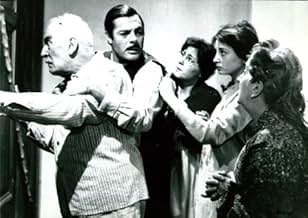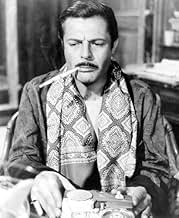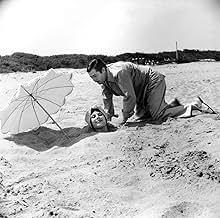NOTE IMDb
7,9/10
15 k
MA NOTE
Un baron sicilien marié tombe amoureux de sa cousine et se jure de l'épouser, mais le divorce étant illégal, il doit élaborer un crime passionnel pour en finir avec sa femme.Un baron sicilien marié tombe amoureux de sa cousine et se jure de l'épouser, mais le divorce étant illégal, il doit élaborer un crime passionnel pour en finir avec sa femme.Un baron sicilien marié tombe amoureux de sa cousine et se jure de l'épouser, mais le divorce étant illégal, il doit élaborer un crime passionnel pour en finir avec sa femme.
- Réalisation
- Scénario
- Casting principal
- Récompensé par 1 Oscar
- 12 victoires et 9 nominations au total
Avis à la une
This classic Italian film is a comedy that tells the story of Ferdinando Cefalu who is unhappily married for 15 years, but he falls in love with his wife's niece, and he starts a plan to end his marriage and not be criticized by the old and classy Italian society. In the meantime, in order to complete his plan many things happened including funny moments and some dramatic moments. The movie seems to have been very well directed and very well acted and gives us a little hint about the behavior of the Sicilian society. In order to do his plan, Ferdinando chooses a crazy idea, and takes a long time to plan and detail his plan perfectly having a lot of funny interruptions during the process of his plan. Its refreshing to find movies with good sense of humor, and no use of vulgarities or bad language to make the viewers laugh. I really enjoyed it, and i deeply recommend watching it.
When I first saw Pietro Germi's movies (a long time ago), I thought he was a misogynist who portrayed women as grotesque monsters that make men's lives miserable. Thirty years later, after the women's movement, I have come around 180 degrees, and see him as a feminist before his time--showing how the patriarchal family destroys women (and men)and exposing the absurdity of "family honor"--and doing it with humor. It doesn't just apply to Sicily. The Sicilian setting and ambiance is a big part of this movie, however--watch for all the little details of gestures and interactions, and the great shots of the sunbaked town, baroque churches, and interiors of the decaying houses of the aristocrats. Mastroianni is terrific, and so is the supporting cast.
(Note: Over 500 of my movie reviews are now available in my book "Cut to the Chaise Lounge or I Can't Believe I Swallowed the Remote!" Get it at Amazon.)
Divorzio all'italiana is a richly textured satire of Sicilian macho Catholic life styles starring one of Italy's greatest actors, Marcello Mastroianni. He is a bit Chaplinesque in this tongue in cheek exploration of how to dump your wife and marry your 16-year-old cousin. His wide-eyed, dead pan expressions combined with vulnerability and suave, leading-man good looks made him the heart-throb of women for decades. He plays a bored baron stuck with a baroness (played fatuously by Daniela Rocca) that he cannot abide. It should be noted that today it IS possible to get a divorce in Italy, but at the time it was very difficult, perhaps easier to get an annulment, and so we have the premise of the plot.
Stefania Sandrelli, who became one of the great ladies of the Italian cinema, plays the cousin. She was only 15 when the film was shot but could easily pass for, say, 18. She is sensual, sweet and a bit naughty. In the final scene, famous for its fitting irony, the last thing we see are her feet. I won't tell you more, but the movie is almost worth seeing just for that final scene.
Rocca's Rosalia on the other hand is more syrupy than sweet and would qualify as clinging. She could smother a lumberjack, and although it is not polite to comment unfavorably on a lady's looks, I must note that she seemed to be having a bad facial hair day, everyday. Her impersonation of a country baroness nonetheless was unforgettable. I also liked 16-year-old Margherita Girelli as Sisini, the maid. Her coquettish ways helped to lend a French bedroom farce flavor to the film.
But what really makes this one of the great monuments of the Italian cinema is the witty and delightful script by Ennio De Concini (it won an Academy Award in 1962) and the detailed, textured direction by Pietro Germi. The picture that Germi paints of life in a small Sicilian (or southern Italian, for that matter) village is picturesque, much imitated, and indelible. The crowded ornate clutter of the old estate, the sun-drenched streets and the monolithic stone and mason churches haunt our memory. True, the film starts a bit slowly and drags (at least for modern audiences) a bit at times, but don't make the mistake of giving up on this. The latter half of the film is wonderful. And remember, if you had to go to film school, Divorce Italian Style would be on the syllabus.
So see this for Mastroianni of course but also because no film education would be complete without having seen Divorzio all'italiana.
The Criterion Collection DVD includes a second disc with a documentary on Germi's career, an interview with Ennio De Concini, and screen-test footage of Stefania Sandrelli and Daniela Rocca that I just had to see. There is also a booklet with reviews of the film from Stuart Klawans, Andrew Sarris, and Martin Scorsese. Scorsese's review is adoring and nostalgic since he is from Sicily and since the film had made such a lasting impression on him as a 19-year-old. For him the film was not so much a comedy as a true reflection of a life he and his family had known. He writes, "Every detail in Divorce Italian Style is so truthful and right that all Germi had to do was heighten everything a bit to make it funny."
Divorzio all'italiana is a richly textured satire of Sicilian macho Catholic life styles starring one of Italy's greatest actors, Marcello Mastroianni. He is a bit Chaplinesque in this tongue in cheek exploration of how to dump your wife and marry your 16-year-old cousin. His wide-eyed, dead pan expressions combined with vulnerability and suave, leading-man good looks made him the heart-throb of women for decades. He plays a bored baron stuck with a baroness (played fatuously by Daniela Rocca) that he cannot abide. It should be noted that today it IS possible to get a divorce in Italy, but at the time it was very difficult, perhaps easier to get an annulment, and so we have the premise of the plot.
Stefania Sandrelli, who became one of the great ladies of the Italian cinema, plays the cousin. She was only 15 when the film was shot but could easily pass for, say, 18. She is sensual, sweet and a bit naughty. In the final scene, famous for its fitting irony, the last thing we see are her feet. I won't tell you more, but the movie is almost worth seeing just for that final scene.
Rocca's Rosalia on the other hand is more syrupy than sweet and would qualify as clinging. She could smother a lumberjack, and although it is not polite to comment unfavorably on a lady's looks, I must note that she seemed to be having a bad facial hair day, everyday. Her impersonation of a country baroness nonetheless was unforgettable. I also liked 16-year-old Margherita Girelli as Sisini, the maid. Her coquettish ways helped to lend a French bedroom farce flavor to the film.
But what really makes this one of the great monuments of the Italian cinema is the witty and delightful script by Ennio De Concini (it won an Academy Award in 1962) and the detailed, textured direction by Pietro Germi. The picture that Germi paints of life in a small Sicilian (or southern Italian, for that matter) village is picturesque, much imitated, and indelible. The crowded ornate clutter of the old estate, the sun-drenched streets and the monolithic stone and mason churches haunt our memory. True, the film starts a bit slowly and drags (at least for modern audiences) a bit at times, but don't make the mistake of giving up on this. The latter half of the film is wonderful. And remember, if you had to go to film school, Divorce Italian Style would be on the syllabus.
So see this for Mastroianni of course but also because no film education would be complete without having seen Divorzio all'italiana.
The Criterion Collection DVD includes a second disc with a documentary on Germi's career, an interview with Ennio De Concini, and screen-test footage of Stefania Sandrelli and Daniela Rocca that I just had to see. There is also a booklet with reviews of the film from Stuart Klawans, Andrew Sarris, and Martin Scorsese. Scorsese's review is adoring and nostalgic since he is from Sicily and since the film had made such a lasting impression on him as a 19-year-old. For him the film was not so much a comedy as a true reflection of a life he and his family had known. He writes, "Every detail in Divorce Italian Style is so truthful and right that all Germi had to do was heighten everything a bit to make it funny."
There's a moment in Pietro Germi's Divorzio all'italiana (aka: Divorce Italian Style) that pretty much defines everything, that sort of defines what a black comedy is all about: a certain woman murders her husband because he had run away with another woman, that certain woman murdered him while he was out with his new love. And that certain woman had something similar with our main character, Marcello Mastroianni's Baron Ferdinando Cefalù, and actually after the murder she crossed path with Ferdinando. The moment that sort of defines everything is when these two, the certain woman and our main character, are together since is Mastroianni delivering a really great laugh, is Ferninando being like "" ...certainly and certainly is the way that Mastroianni delivers the scene that makes it so fantastic and hilarious.
This movie got an Oscar for the script (among the others, by Pietro Germi, the gifted director). However, the real importance of this movie can be demonstrated by saying that an entire genre, "la commedia all'italiana" (Comedy, Italian style) is named after this movie.
A major issue of this genre is to make fun of our traditions and culture (I am Italian) despite the radical changes our Country was having during those years ('60s, '70s).
The main issue of Neo-realism (Rossellini, De Sica, Visconti) was to describe the tragic reality of miserable lives after the catastrophic WWII. Then the Italian economic boom of the '50s drove Italy into modernity and wellness. Commedia all'italiana wanted to remind us that despite this modernity we are always the same Italians we were before, with all our intelligence but also with all our defects.
"Divorce, Italian Style" is set in the most 'conservative' place of Italy of that time, where traditions like family honor were still predominant despite all modernity. In the first shots of the movie we see an environment suffocated by the heat of the Sicilian climate. People spend part of the day in their apartments waiting for the cool evening. This motionless environment is highly metaphoric, as it shows that nothing really changes in this land, suffocated by the weight of old traditions. Probably this is not so true today, but at that time certainly was.
However, don't be scared by this introduction. The movie is FUN and it turns into a fast-paced rhythm shortly.
The protagonist loves his cousin and wants to marry her, but he is already married. So he plans to murder the wife, pretending to do that for a 'legitimate' defence of honor. What is amazing is that all the village, all the people in the movie support murder for the honor of the family. They even induce him to kill. And what is sad, is that the law at that time was really soft for those types of murders.
To summarize this movie has these characteristics: 1) VERY FUN. You can't stop laughing even if the script is tragic (this is a characteristic of masterpieces) 2) WELL ACTED: Marcello Mastroianni gives one of his best performances. Stefania Sandrelli is beautiful as ever, Marcello's wife is ugly and a nuisance as her role imposes, and Leopoldo Trieste is another great actor of Italian cinema.
3) WONDERFUL STORY: the script won the Oscar and it is truly very intelligent 4) SOCIALLY COMMITTED: it is an accusation of a wrong law that supports a wrong tradition (the law was changed shortly after).
I give this masterpiece a 10 out of 10, and I strongly recommend it to everyone.
A major issue of this genre is to make fun of our traditions and culture (I am Italian) despite the radical changes our Country was having during those years ('60s, '70s).
The main issue of Neo-realism (Rossellini, De Sica, Visconti) was to describe the tragic reality of miserable lives after the catastrophic WWII. Then the Italian economic boom of the '50s drove Italy into modernity and wellness. Commedia all'italiana wanted to remind us that despite this modernity we are always the same Italians we were before, with all our intelligence but also with all our defects.
"Divorce, Italian Style" is set in the most 'conservative' place of Italy of that time, where traditions like family honor were still predominant despite all modernity. In the first shots of the movie we see an environment suffocated by the heat of the Sicilian climate. People spend part of the day in their apartments waiting for the cool evening. This motionless environment is highly metaphoric, as it shows that nothing really changes in this land, suffocated by the weight of old traditions. Probably this is not so true today, but at that time certainly was.
However, don't be scared by this introduction. The movie is FUN and it turns into a fast-paced rhythm shortly.
The protagonist loves his cousin and wants to marry her, but he is already married. So he plans to murder the wife, pretending to do that for a 'legitimate' defence of honor. What is amazing is that all the village, all the people in the movie support murder for the honor of the family. They even induce him to kill. And what is sad, is that the law at that time was really soft for those types of murders.
To summarize this movie has these characteristics: 1) VERY FUN. You can't stop laughing even if the script is tragic (this is a characteristic of masterpieces) 2) WELL ACTED: Marcello Mastroianni gives one of his best performances. Stefania Sandrelli is beautiful as ever, Marcello's wife is ugly and a nuisance as her role imposes, and Leopoldo Trieste is another great actor of Italian cinema.
3) WONDERFUL STORY: the script won the Oscar and it is truly very intelligent 4) SOCIALLY COMMITTED: it is an accusation of a wrong law that supports a wrong tradition (the law was changed shortly after).
I give this masterpiece a 10 out of 10, and I strongly recommend it to everyone.
Le saviez-vous
- AnecdotesThe "honor killing" law, which provided mitigating circumstances for anyone who killed his "spouse, daughter or sister" (or their lover) upon discovering them "in illegitimate carnal relations", was definitely abrogated in Italy in 1981, exactly 20 years after the release of this movie.
- GaffesWhen Ferdinando gets in bed with Rosalia after their fight, Rosalia's head facings change significantly between shots.
- Citations
Ferdinando Cefalù: Have you really got another headache?
- ConnexionsEdited into Lo schermo a tre punte (1995)
Meilleurs choix
Connectez-vous pour évaluer et suivre la liste de favoris afin de recevoir des recommandations personnalisées
- How long is Divorce Italian Style?Alimenté par Alexa
Détails
- Date de sortie
- Pays d’origine
- Langue
- Aussi connu sous le nom de
- Divorce Italian Style
- Lieux de tournage
- Ispica, Ragusa, Sicily, Italie(the Cefalus' hometown)
- Sociétés de production
- Voir plus de crédits d'entreprise sur IMDbPro
Box-office
- Montant brut mondial
- 131 467 $US
- Durée
- 1h 45min(105 min)
- Couleur
- Rapport de forme
- 1.85 : 1
Contribuer à cette page
Suggérer une modification ou ajouter du contenu manquant

![Regarder Trailer [OV]](https://m.media-amazon.com/images/M/MV5BY2IwZTI1YmUtNTg4YS00OTNlLTkyYjUtZTE5ZjA5MTc4OGI1XkEyXkFqcGdeQXRyYW5zY29kZS13b3JrZmxvdw@@._V1_QL75_UX500_CR0)














